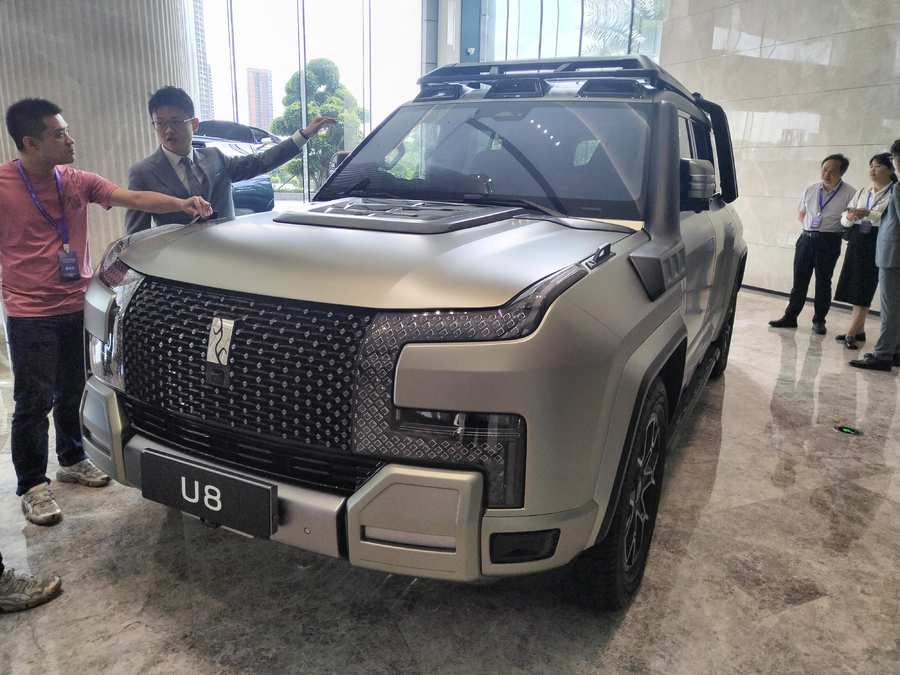(JW Insights) Jul 12 -- Sales of homegrown passenger-car brands in China are consistently eclipsing those of their Western rivals, signaling the growing influence of the country’s electric-vehicle makersand a triumph for Beijing’s industrial policy, reported The Wall Street Journal on July 10.

Local brands captured 54% of China’s wholesale car market in the first six months of 2023, from 48% a year earlier, the China Passenger Car Association (CPCA) said on July 10. That is the second consecutive time local brands have surpassed foreign ones on a half-year basis, according to Cui Dongshu, the industry body’s secretary-general. Wholesale figures include vehicle exports.
Western carmakers have dominated China since they were first allowed to set up joint ventures with local partners decades ago. Some made a fortune as the country sped past the U.S. to become the world’s biggest auto market. But as homegrown brands solidify the trend of outselling foreign rivals, the era of Western dominance is over, said the WSJ report.
China’s auto revolution is being driven by its commanding lead in battery powered and plug-in hybrid carsthe only types of vehicle for which demand has been consistently growing. Led by BYD, nine local manufacturers were among China’s 10 bestselling electric-vehicle makers in June, according to CPCA data. Tesla was the only foreign carmaker on the list.
Sales of electric and plug-in hybrid passenger cars jumped 44% in the first half of 2023 to more than 3.5 million vehicles, making up around a third of total sales that grew almost 9% over the same period, the data showed. Some industry experts predict electric cars will outsell gas-fueled ones in China in the next four years. In the U.S., electric vehicles’ market share was 7% in the first half, after sales surged 50% to 557,330 units.
Foreign carmakers can no longer succeed simply by bringing in global models, or what is popular overseas.
The rise of China’s EV makers is another victory for Beijing’s industrial policies, following high-speed rail, solar panels and batteries.
To build the EV market, China bankrolled local manufacturers and subsidized sales, prodding the industry along with production targets and tighter emissions standards. For a few years, only EVs with Chinese-made batteries were eligible for subsidies as the government set out to control more of the supply chain.
For the first five months of the year, 45% of vehicles sold in Shanghai were electric or plug-in hybrids, Volkswagen said. In less developed cities, the transition has been slower.
BYD, backed by billionaire investor Warren Buffett, stopped making cars powered solely by gasoline in March last year. The company sold over 1.2 million electric vehicles and plug-in hybrids in China in the first six months of 2023, almost double from a year earlier. More than half of those were plug-ins.
Meanwhile, sales of U.S.-listed NIO and Xpeng have dropped in recent months amid cutthroat price cutting.
Chinese carmakers are also going global. The country surpassed Japan in the first quarter of 2023 as the biggest exporter of vehicles, though about three-quarters of the 1.1 million autos shipped abroad were internal-combustion-engine models, Automobility data show.
BYD this month said that it will open an EV complex in Brazil, while state-owned SAIC said it plans a plant in Europe. SAIC and Great Wall Motor are manufacturing in Thailand, where BYD and several other Chinese carmakers said they plan factories, according to the report from WSJ.
(Gao J)
WSJ: The era of Western carmakers is over in China with local brands taking lead in sales again in half-year basis
(JW Insights) Jul 12 -- Sales of homegrown passenger-car brands in China are consistently eclipsing those of their Western rivals, signaling the growing influence of the country’s electric-vehicle makersand a triumph for Beijing’s industrial policy, reported The Wall Street Journal on July 10.

Local brands captured 54% of China’s wholesale car market in the first six months of 2023, from 48% a year earlier, the China Passenger Car Association (CPCA) said on July 10. That is the second consecutive time local brands have surpassed foreign ones on a half-year basis, according to Cui Dongshu, the industry body’s secretary-general. Wholesale figures include vehicle exports.
Western carmakers have dominated China since they were first allowed to set up joint ventures with local partners decades ago. Some made a fortune as the country sped past the U.S. to become the world’s biggest auto market. But as homegrown brands solidify the trend of outselling foreign rivals, the era of Western dominance is over, said the WSJ report.
China’s auto revolution is being driven by its commanding lead in battery powered and plug-in hybrid carsthe only types of vehicle for which demand has been consistently growing. Led by BYD, nine local manufacturers were among China’s 10 bestselling electric-vehicle makers in June, according to CPCA data. Tesla was the only foreign carmaker on the list.
Sales of electric and plug-in hybrid passenger cars jumped 44% in the first half of 2023 to more than 3.5 million vehicles, making up around a third of total sales that grew almost 9% over the same period, the data showed. Some industry experts predict electric cars will outsell gas-fueled ones in China in the next four years. In the U.S., electric vehicles’ market share was 7% in the first half, after sales surged 50% to 557,330 units.
Foreign carmakers can no longer succeed simply by bringing in global models, or what is popular overseas.
The rise of China’s EV makers is another victory for Beijing’s industrial policies, following high-speed rail, solar panels and batteries.
To build the EV market, China bankrolled local manufacturers and subsidized sales, prodding the industry along with production targets and tighter emissions standards. For a few years, only EVs with Chinese-made batteries were eligible for subsidies as the government set out to control more of the supply chain.
For the first five months of the year, 45% of vehicles sold in Shanghai were electric or plug-in hybrids, Volkswagen said. In less developed cities, the transition has been slower.
BYD, backed by billionaire investor Warren Buffett, stopped making cars powered solely by gasoline in March last year. The company sold over 1.2 million electric vehicles and plug-in hybrids in China in the first six months of 2023, almost double from a year earlier. More than half of those were plug-ins.
Meanwhile, sales of U.S.-listed NIO and Xpeng have dropped in recent months amid cutthroat price cutting.
Chinese carmakers are also going global. The country surpassed Japan in the first quarter of 2023 as the biggest exporter of vehicles, though about three-quarters of the 1.1 million autos shipped abroad were internal-combustion-engine models, Automobility data show.
BYD this month said that it will open an EV complex in Brazil, while state-owned SAIC said it plans a plant in Europe. SAIC and Great Wall Motor are manufacturing in Thailand, where BYD and several other Chinese carmakers said they plan factories, according to the report from WSJ.
(Gao J)
本文关键词:澳门威尼克斯人网站,澳门人威尼斯官网,澳门威斯人官方网站登录
本文来源:澳门威尼克斯人网站-www.91yifen.com


 全国服务热线
全国服务热线